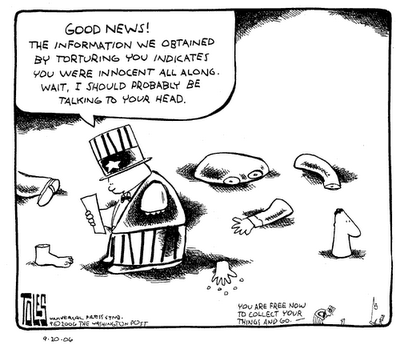AMY GOODMAN: You gave an example, Senator Leahy, when you talked about what would happen here. And, I mean, even the fact that “habeas corpus” is in Latin, I think, distances people. They don’t quite understand what this is about.
SEN. PATRICK LEAHY: “Bring the body.”
AMY GOODMAN: You gave a very -- sorry?
SEN. PATRICK LEAHY: “Bring the body.”
AMY GOODMAN: You gave a very graphic example. You said, “Imagine you’re a law-abiding lawful permanent resident. In your spare time you do charitable fundraising for international relief agencies that lend a hand in disasters.” Take that story from there, the example you used.
SEN. PATRICK LEAHY: You send money. You don’t care which particular religious group or civic group it is. They’re doing humanitarian work. You send the money. It turns out that one of them is giving money to various Islamic causes that the United States is concerned about. They come to your house. Maybe somebody has called into one of these anonymous tipster lines, saying, “You know, this Amy Goodman. I’m somewhat worried about her, simply because she’s going -- and I think I’ve seen some Muslim-looking people coming to her house.” They come in there, and they say, “We want to talk to you.” They bring you downtown. You’re a legal alien, legal resident here. And you say, “Well, look, I’ve got my rights. I’d like to talk to a lawyer.” They say, “No, no. You don’t have any rights.” “Well, then I’m not going to talk to you.” “Well, then now we’re twice as concerned about you. We’re going to spirit you down to Guantanamo, and we’ll get back to in a few years.” And, I mean, that could actually happen under this. And these are not far-fetched ideas, as the professor knows. He’s seen similar things.
And with that, and I would love to continue this conversation, unfortunately I’ve got to go back to my day job, back to the judiciary. I think this is going to go down as one of those black marks in the Congress. You know, I wasn’t there at the time, but virtually everybody voted for the Tonkin Gulf resolution. When I came to the Senate, you couldn’t find anybody there who thought that was a good idea. They knew it was a terrible mistake. You had members of congress supported the internment of the Japanese Americans during World War II. Everybody knows that was a terrible mistake now. That day will come when everybody will look at this and say, “What were we thinking?”
AMY GOODMAN: Patrick Leahy, thanks very much for joining us. We only have about 30 seconds. Michael Ratner, president of Center for Constitutional Rights, your final comment on this.
MICHAEL RATNER: This was really, as the senator said, probably the worst piece of legislation I’ve seen in my 40-year career as a lawyer. The idea, and even the example Senator Leahy gave, of someone being picked up, you don’t need anything. The President can decide tomorrow that you, Amy, or me, or particularly a non-citizen, can be picked up, put in jail forever, essentially, and if you're a non-citizen in Guantanamo or anywhere else in the world, you never get a chance to go to court to test your detention. It’s an incredible thing, and any senator who voted for this, in my view, is essentially guilty, guilty, guilty of undermining basic fundamental rights and may well be guilty of war crimes, as well.


